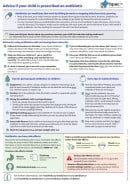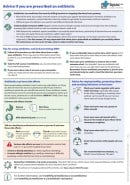You can now add Healthify as a preferred source on Google. Click here to see us when you search Google.
Azithromycin
Sounds like 'a-zith-roh-my-sin'
Key points about azithromycin
- Azithromycin is an antibiotic used to treat some infections caused by bacteria.
- Azithromycin is commonly called Zithromax®.
- Find out how to take it safely and possible side effects.

Azithromycin is an antibiotic used to treat different infections caused by bacteria such as whooping cough, infections of the ear, skin and genitals (eg, gonorrhoea or chlamydia).
Azithromycin is also used to prevent infections in people with cystic fibrosis.
It belongs to a family of antibiotics called macrolides that work by killing or stopping the growth of bacteria (bugs) that cause the infection. Azithromycin isn’t effective against infections caused by viruses.
In Aotearoa New Zealand azithromycin is only available on a prescription.
In Aotearoa New Zealand, azithromycin is available as tablets (250 mg and 500 mg) and liquid (200 mg in 5 mL).
- Always take your azithromycin exactly as your healthcare provider has told you. The pharmacy label on your medicine will tell you how much to take, how often to take it, and any special instructions.
- The dose of azithromycin will be different for different people depending on the type of infection and your age.
- The dose for children will depend on their body weight.
- The usual dose in adults is 500 mg once a day for 1 to 3 days, then 250 mg once a day for the rest of the course.
- Your healthcare provider will advise you on the dose to take and how long to take azithromycin for (usually 5 days). For genital infections (gonorrhoea and chlamydia) azithromycin is taken once as a single 1 gram dose (2 x 500 milligram tablets).
- Timing of your doses: Azithromycin is usually taken once a day. Take your dose at about the same time each day.
- Food: You can take azithromycin with or without food.
- Tablets: Swallow your tablet with a drink of water.
- Liquid azithromycin: Shake the bottle well and use an oral syringe or measuring spoon to carefully measure each dose.
- Missed dose: If you forget to take azithromycin, take it as soon as you remember. But if it's nearly time for your next dose, just take the next dose at the usual time. Don't take double the dose.
- Finish the course: Keep taking azithromycin until you finish the course, or for as long as your healthcare provider tells you to.
For information on how to give azithromycin to children, see azithromycin information for parents and carers.(external link)
Here are some things to know when you're taking azithromycin. Other things may be important as well, so ask your healthcare provider what you should know about.
- Other medicines: Azithromycin interacts with some medicines (eg, warfarin and digoxin), herbal supplements and rongoā Māori, so check with your healthcare provider before starting azithromycin and before starting any new products.
- Indigestion medicines: If you also take indigestion remedies, take them at least 2 hours before or after you take your azithromycin.
- Alcohol: Azithromycin doesn't directly interact with alcohol. This means that most people could have the occasional drink while taking it without any serious problems. However, if azithromycin makes you feel sick (nausea), don't drink alcohol as it will make you feel worse.
- Pregnancy or breastfeeding: Talk to your healthcare provider if you're pregnant, planning a pregnancy or want to breastfeed.
- Vaccines: Azithromycin may stop the oral typhoid vaccine from working. Leave a space of 3 days between the typhoid vaccine and this antibiotic.
- Other partners: If you’re taking azithromycin for genital infections (gonorrhoea and chlamydia) then people you’ve had sex with recently will also need treatment.
Like all medicines azithromycin can cause side effects, although not everyone gets them. If you're concerned about any symptoms you think might be related to your medicine, talk to your healthcare provider. The following information offers some guidance but doesn't include all possible side effects.
Common side effects
Tell your healthcare provider if these side effects bother you.
- Sore tummy, feeling bloated, gas in the tummy: Try taking your azithromycin with food.
- Feeling sick (nausea), being sick (vomiting) or diarrhoea (runny poo): Tell your healthcare provider if your diarrhoea is severe, contains blood or lasts more than a few days. If you have a lot of diarrhoea or have been vomiting and you're taking the oral contraceptive pill, let your healthcare provider know.
- Headache.
- Small white patches in your mouth or a white furry tongue (oral thrush): Ask your healthcare provider for advice.
- Vaginal itching, soreness or discharge (vaginal thrush): Ask your healthcare provider for advice.
Tell your healthcare provider immediately or phone Healthline free on 0800 611 116 if these occur
- Fainting or feeling like your heart is beating too fast.
- Signs of problems with your liver such as yellowing of the skin or eyes, dark urine, pain in the tummy.
Phone 111 for an ambulance or go to your nearest accident and emergency (A&E) clinic if these occur
- Signs of an allergic reaction such as itchy skin, and rash, swollen lips or tongue, problems breathing, like a tight chest or shortness of breath.
Read more about medicines and side effects and reporting a reaction you think might be a side effect.
Azithromycin(external link) NZ Formulary Patient Information
Azithromycin (for chlamydia)(external link) NZ Formulary Patient Information
Zithromax(external link) Medsafe Consumer Information Sheet, NZ
Brochures
Azithromycin for bacterial infections(external link) Medicines for Children, NZ, 2019
Advice if you are prescribed an antibiotic(external link) BPAC, NZ, 2024
Advice if your child is prescribed an antibiotic(external link) BPAC, NZ, 2024
Medicines and side effects(external link) Healthify He Puna Waiora, NZ, 2024
References
- Azithromycin(external link) NZ Formulary
- Zithromax(external link) Medsafe datasheet, NZ
- Check INR after starting roxithromycin for patients on warfarin(external link) Medsafe, NZ, 2015
- Upfront: Azithromycin – use it wisely(external link) BPAC, NZ, 2014
- Macrolides – don’t upset the rhythm(external link) Medsafe, NZ, 2015
- Antibiotic guide – choices for common infections(external link) BPAC, NZ, 2023
Brochures

Advice if your child is prescribed an antibiotic
BPAC, NZ, 2024

Medicines and side effects
Healthify He Puna Waiora, NZ, 2024
Credits: Healthify editorial team. Healthify is brought to you by Health Navigator Charitable Trust.
Reviewed by: Stephanie Yee, Pharmacist, Auckland
Last reviewed:






